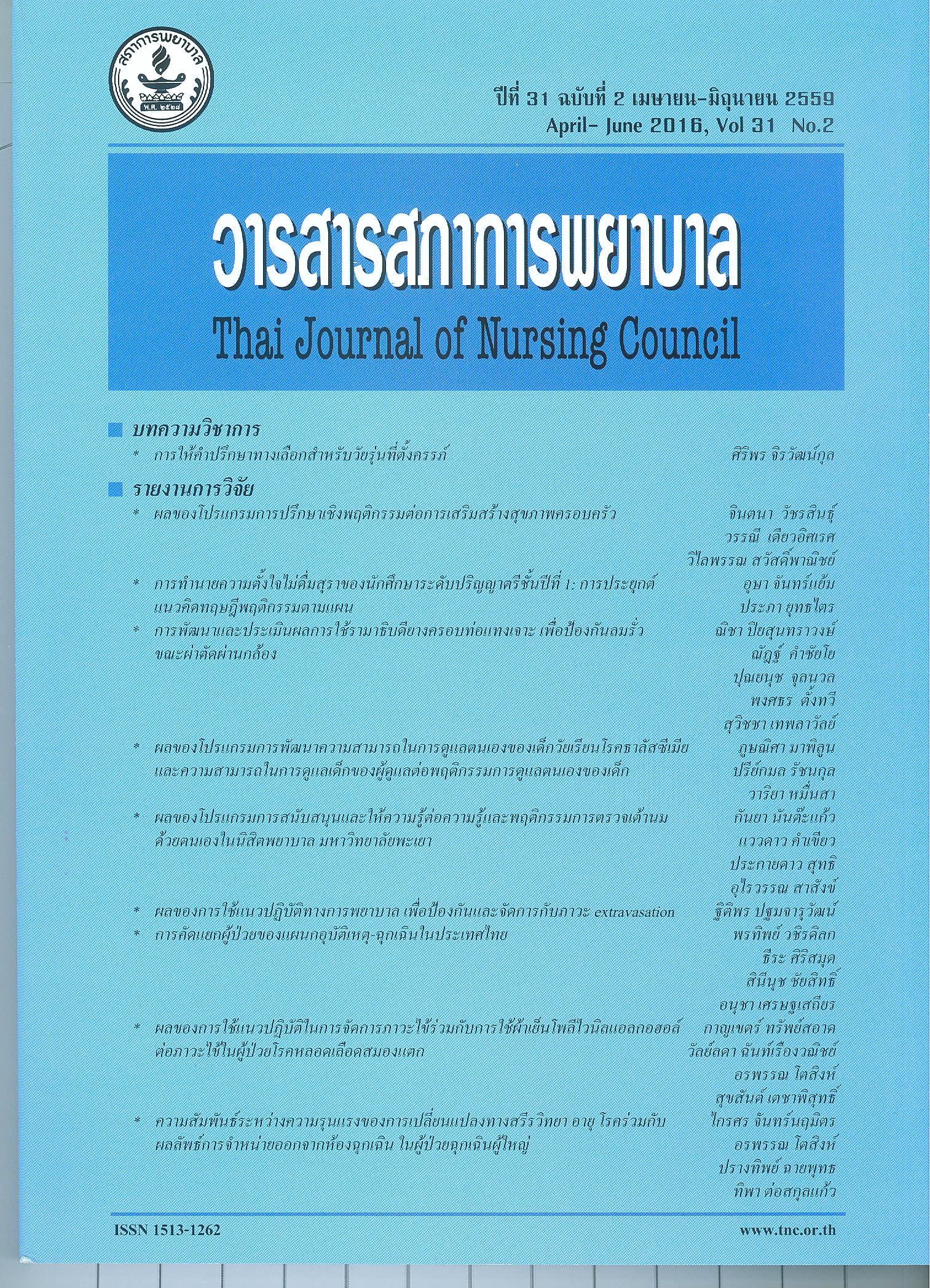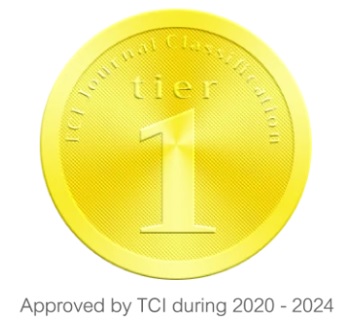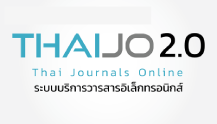การทำนายความตั้งใจไม่ดื่มสุราของนักศึกษาระดับปริญญาตรีชั้นปีที่ 1: การประยุกต์แนวคิดทฤษฎีพฤติกรรมตามแผน
Keywords:
ทฤษฎีพฤติกรรมตามแผน ความเชื่อพื้นฐานที่สำคัญ ความตั้งใจไม่ดื่มสุรา นักศึกษามหาวิทยาลัย, theory of planned behaviour, alcohol abstinence intention, important basic beliefs, university studentsAbstract
วัตถุประสงค์: เพื่อศึกษาอำนาจการทำนายของความเชื่อสำคัญเกี่ยวกับพฤติกรรม กลุ่มอ้างอิง และการควบคุมต่อความตั้งใจในการไม่ดื่มสุราในอีก 6 เดือนข้างหน้า
การออกแบบวิจัย: ความสัมพันธ์เชิงทำนายโดยใช้ทฤษฎีพฤติกรรมตามแผนเป็นกรอบแนวคิดในการวิจัยและพัฒนาเครื่องมือวิจัย
วิธีดำเนินการวิจัย: กลุ่มตัวอย่างเป็นนักศึกษาชั้นปีที่1ของมหาวิทยาลัย ทางภาคใต้ของประเทศไทยแห่งหนึ่งจำนวน 200 คน ครื่องมือที่ใช้ในการวิจัย ประกอบด้วย ข้อมูลส่วนบุคคล ความเชื่อพื้นฐานเกี่ยวกับ 1) พฤติกรรมการไม่ดื่มสุรา 2)กลุ่มอ้างอิงต่อการไม่ดื่มสุรา 3) การควบคุมไม่ดื่มสุรา และ ความตั้งใจในการไม่ดื่มสุรา เก็บรวบรวมข้อมูล จากข้อมูลทุติยภูมิ วิเคราะห์ข้อมูลโดยใช้สถิติเชิงบรรยาย และการวิเคราะห์ถดถอยพหุคูณ
ผลการวิจัย: พบว่ากลุ่มตัวอย่างอายุเฉลี่ย 19.8 ปี (SD = 0.9) เพศหญิงร้อยละ 69.5 มีประวัติเคยดื่มสุราร้อยละ 48.5 และ ปัจจัยความเชื่อสำคัญที่สามารถทำนายความตั้งใจในการไม่ดื่มสุรา ประกอบด้วย ความเชื่อเกี่ยวกับพฤติกรรมที่ว่า “การไม่ดื่มสุราทำให้นักศึกษาภาคภูมิใจ” ความเชื่อเกี่ยวกับกลุ่มอ้างอิงที่ว่า “รุ่นพี่คิดว่านักศึกษาไม่ควรดื่มสุรา” ความเชื่อเกี่ยวกับการควบคุมไม่ดื่มสุราที่ว่า “นักศึกษาจะไม่ดื่มสุราถ้ามีกฎระเบียบหรือผู้ควบคุมและมีกิจกรรมอื่นทำ” และ “นักศึกษาจะไม่ดื่มสุราถึงแม้ว่าจะเข้าร่วมงานสังสรรค์หรือมีเพื่อนชวนดื่มสุรา” และพบว่าทั้ง 3 ปัจจัยสามารถร่วมกันทำนายความตั้งใจในการไม่ดื่มสุราได้ร้อยละ 67.3 (R 2 =673, p<.01)
ข้อเสนอแนะ: การวางแผนป้องกันการดื่มสุราในนักศึกษา มหาวิทยาลัยควรมีนโยบาย กฎระเบียบและแนวปฏิบัติในการป้องกันการดื่มสุราที่ชัดเจน ส่งเสริมให้นักศึกษาร่วมกิจกรรมต่างๆที่สร้างสรรค์ และมีความเชื่อด้านบวกต่อการไม่ดื่มสุรา;
Objective: To examine the predictive power of beliefs in the reference group’s behaviour and control, and the influence of such power on alcohol abstinence intention for the next 6 months.
Design: Predictive correlational research based on the theory of planned behaviour.
Implementation: The sample consisted of 200 undergraduate freshmen at a southern Thai university. The research instrument was a questionnaire designed to obtain (1) personal information and (2) basic information on (a) alcohol abstinence behaviour; (b) alcohol abstinence reference group; and (c) alcohol abstinence control and intention. This study was based on secondary data, which were analysed using descriptive statistics and multiple regression statistics.
Results: The subjects were averagely aged 19.8 years (SD = 0.9), and 69.5 percent of the subjects were female. Nearly half (48.5%) of the subjects had a history of drinking. The beliefs that could predict the subjects’ abstinence from alcohol were (1) the behaviour-based belief that ‘Drinking alcohol gives students no pride’; (2) the reference-group-based belief that ‘Senior students do not think freshmen should drink alcohol’; and (3) the control-based beliefs that ‘Students will not drink alcohol if a rule or a controller prohibits them and if they have other activities to do’ and ‘Students will not drink alcohol even if they join a party or are persuaded by their friends’. All of these three factors could predict alcohol abstinence intention in as high as 67.3 percent of the subjects (R2 = 673, p < .01).
Recommendations: Prevention of university students’ alcohol drinking should be planned based on the institution’s clear regulations, guidelines, and promotion of constructive activities, all for the purpose of building positive attitudes towards abstinence from alcohol.
References
National statistical office. The smoking and drinking behavior survey 2011. Bangkok: Ministry of information and communication technology; 2011. [Cited 2014 Dec 10]. Available from: http:// service.nso.go.th/nso/ nsopublish/themes/files/smokeRep54.pdf (in Thai)
Inklub L, Jongon Jantapo A, Kunnarik T, Kachonseree K, Srisarang P, Meintrarakerd I, et al. Alcohol consumption and perception of impacts on alcohol consumption of studies, in private higher education in west Bangkok and metropolitan areas 2008. [Cited 2014 Dec 10]. Available from:http://cas.or.th/researchs/view/77/desc (in Thai)
Buasorn R, Ratchadapunnathikul G. Alcohol consumption behavior of bachelor degree students in the bangkok area. Rama Nurs J 2012; 18(3):259-71. (in Thai)
Junyaem J. Factors associated with intention to non- drinking among Undergraduate students. [Master s Theses]. Bankok: Mahidol Univ.; 2013. (in Thai)
Vantamay S. Alcohol consumption among university students applying a social ecological approach for multi level preventions. Southeast Asian J Trop Med Pub Health 2009;40(2):354-67.
Borsari B, Murphy JG, Barnett NP. Predictors of alcohol use during the first year of college: Implications for prevention. Addict Behav 2007;32(10):2062-86.
Solprisal B, Kongmukum J, Watanaporn K. Thailand annual report on Alcohol 2010. Bangkok:Print Dee; 2010. (in Thai)
Babor T, Caulkins J, Edwards G, Fischer B, Foxcroft D, Humphreys K , et al. Drug Policy and the Public Good: Summary of the Book. Addiction 2010; 105:1137-45.
Ajzen I. The theory of planned behavior. Organiz Behav Human Decision Process 1991; 50:179-211.
Armitage CJ, Conner M. Efficacy of the theory of planned behavior: A meta-analytic review. J Appl Soc Psychol 2001; 40:471-99.
Bilic B.The theory of planned behavior and health behaviors: critical analysis of methodological and theoretical issues. Hellenic journal of psychol 2005; 2: 243-59.
Gagnon H, Tessier S, Côté J, April N, Julien AS. Psychosocial factors and beliefs related to intention to not binge drink among young adults. Alcohol Alcohol 2012; 47(5): 525-32.
Hamilton K, Schmidt H. Critical beliefs underlying young Australian males’ intentions to engage in drinking and swimming. Sage Open 2013; 3(4):1-7.
Srisatidnarakul B. The methodology in nursing research. 5th ed. Bankok: you& I intermedia; 2010. (in Thai)
Ajzen I. Constructing a TPB questionnaire: Conceptual and methodological considerations, 2002. [Cited 2014 Dec 10]. Available from http://www. people.umass. edu/aizen/pdf/tpb. measurement.pdf
Francis J, Eccles MP, Johnston M, Walker A E, Grimshaw J M, Foy R, et al. Constructing questionnaires based on the theory of planned behavior: A manual for health services researchers. Newcastle upon Tyne, UK; 2004. [Cited 2014 Dec 10]. Available from: http://core.ac. uk/download/pdf/9559500.pdf
Von Haeften I, Fishbein M, Kasprzyk D, Montano D. Analyzing data to obtain information to design targeted interventions. Psycho Health Med 2001; 6:151-64.
Norman P, Bennett P, Lewis H. Understanding binge drinking among young people: An application of the theory of planned behavior. Health Educ. Res 1998; 13(2):163-9.
Johnston KL, White KM. Beliefs underlying binge in young female undergraduate students: A theory of planned behavior perspective. Youth Studies Australia 2004; 23(2): 22-30.
French DP, Cook R. Using the theory of planned behavior to understand binge drinking: The importance of beliefs for developing interventions. Brit J health psych 2012; 7:1-17.
Ajzen I. The theory of planned behaviour: reactions and reflections. Psychol Health 2011; 26(9):1113-27.
Hobbis IC, Sutton S. Are techniques used in cognitive behavior therapy applicable to behavior change interventions based on the theory of planned behavior? J Health Psychol 2005; 10:7-18.
Sniehotta FF. Towards a theory of intentional behavior change: Plans, planning, and self-regulation. Brit J health psych 2009; 14: 261-73.






